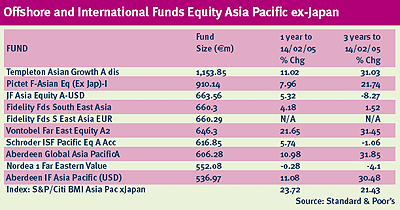LOCAL CONSUMERS LIFT REGIONAL GROWTH

With low interest rates, improving property prices and local consumers readily spending, Asia Pacific is steadily attracting new assets. Paula Garrido reports
The potential for Asian consumers to spend is creating great opportunities for growth and investors should take note.
According to data from Standard & Poor’s, the combined assets of the 10 largest international and offshore funds investing in the Asia Pacific ex-Japan region, represent more than E7bn, and the potential for attracting new assets is high.
European investors have been investing in Asian equities for a long time, but exposure to this type of investments is still low compared with investments in other regions.
“If you look at all the money invested in equities across the world, the percentage allocated to Asia is very low, partly because index representation of Asia is artificially low,” says Ashutosh Sinha, Asia Pacific fund manager for Morgan Stanley Investment Management (MSIM).
“But the potential for Asian consumers to spend and contribute to growth in Asia is very strong,” adds Mr Sinha. “We are looking at many countries where interest rates are low, property prices are improving and the propensity to spend is growing. You see this consumer boom in China, India and in Thailand,” he says. “If you look at China, for instance, five to six years ago the total car sales were less than 300,000 a year. This year it will be 3m, and it could potentially be 10m in five to seven years.”
One of the funds managed by his team, the Luxembourg Sicav Asian Equity fund, that had $370m ( E284m) under management at the end of last year, follows the team’s approach of integrating top-down and bottom-up disciplines. “We classify our investment style mostly as growth investors because Asia ex-Japan is not really a developed asset class where you can have growth and value indices as you have in the US or in the UK.
“The best way to optimise returns for Asia is to invest in the best stocks, in the best countries, that are capitalising on growth of the region,” Mr Sinha adds.
SOUTH EASTERN INTEREST
Mark Mobius, manager of the Templeton Asian Growth fund, is also optimistic about the growth potential of the region. “The most interesting countries are Taiwan and Korea. Interest is growing in south east Asia – Thailand for instance,” he says. The Asian Growth fund has assets under management in excess of E1.1bn (see table). “Generally the interest in Asian equities is quite high. More money is coming in, so we are seeing a different situation to what we previously had,” Mr Mobius adds noting that European investors are increasingly interested in the firm’s Asian funds.
He identifies sectors driven by consumer demand and commodities as the key areas to invest in.
At MSIM, Mr Sinha’s team looks at companies’ business models that can also generate healthy cash flows and make good use of them in the best interest of their shareholders. “The issue in Asia is that sometimes companies have a good business and good cash flows but they don’t use their cash wisely.
“For instance a brewery that generates a lot of cash may use it to buy a golf course, which is not rational to its business market, and we have to keep questioning that logic and meeting managers again and again to make sure they do the right thing.”
Apart from these criteria, Mr Sinha explains that they also carefully look at the valuation of the stock or country in question and at the sentiment around it. “If sentiment is negative and markets are ignored and cheap, and noone wants to go there, then we look at it as a positive sign,” he says.
“For instance everybody is talking about China. You go there and you see all this construction going on and you think that one day all this has to end, because it can’t continue for ever,” he says, explaining that his firm is extremely cautious when it comes to investing there. “We underweighted China last year and it underperformed because there has been a lot of froth and bubble created in that market at this point. This is just an example of how we look at sentiment.”
At Templeton, Mr Mobius also comments on the prospects for China. “China’s potential growth used to be very good and we expect that to continue. It will continue to grow but maybe slightly slower, but it will still be quite significant,” he says.




